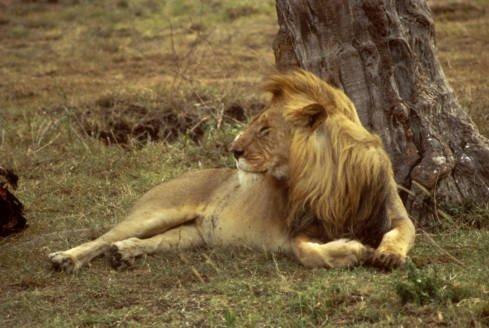USFWS Considers Petition from Anti-Hunting Groups to Shut Down African Lion Trophy Imports
The New York Times recently ran an Op-ed piece by Alexander N. Songorwa, who is director of wildlife for the Tanzanian Ministry of Natural Resources and Tourism. In his editorial, "Saving Lions by Killing Them," Songorwa practically begs our country to continue hunting lions in his country - and to be allowed to bring back these trophies.
Why does Songorwa feel compelled to place an editorial in one of the most prevalent newspapers in the country, you may ask?

Take a look at the petitioners. You might not need to read further if you know their positions on hunting, especially what they ignorantly call "trophy" hunting. These groups also refuse to make any distinction between illegal poaching and managed hunting. But why bother with such trivial facts, right?
In the NYT piece, Sangorwa declared, The millions of dollars that hunters spend to go on safari here each year help finance the game reserves, wildlife management areas and conservation efforts in our rapidly growing country. This is why we are alarmed that the United States Fish and Wildlife Service is considering listing the African lion as endangered. Doing so would make it illegal for American hunters to bring their trophies home. Those hunters constitute 60 percent of our trophy-hunting market, and losing them would be disastrous to our conservation efforts.
Then, Sangorwa wields a sword at the five groups that brought the petition. He wrote that the groups' petition stated the lion population had fallen dangerously low because of habitat loss, poaching, commercial hunting and new diseases associated with human encroachment.
Take note here. Sangorwa states clearly that hunting has not, in any way, impacted the lion population. In fact, he makes a strong argument that lion numbers are stronger because of the revenue and attention hunting brings to the species. Could it be that HSUS and its ilk are actually more concerned with eliminating a form of hunting than they are with the ultimate survival of the species?
I contacted the USFWS about the petition and its status. Within minutes, I received this reply from Vanessa Kaufmann in the Office of Public Affairs: On background (means not attributable, the rule is still under review. As part of the status review process, we are requesting scientific and commercial data and other information regarding this subspecies, including reaching out to range countries as well as reviewing all comments that came in as required as part of the process under the ESA.)
According to Kaufman, the USFWS will look at a range of factors, including historical and current population levels, habitat requirements, species' biology and many other factors - found at the USFWS policy library. It makes for very heavy reading.
The USFWS posts all comments at a special page. It does not accept emails or faxes.
Sangorwa defends the hunting quotas, writing, The lion population in Tanzania is not endangered. We have an estimated 16,800 lions, perhaps 40 percent of all lions on the continent, the biggest population in the world. Their numbers are stable here, and while our hunting system is not perfect, we have taken aggressive efforts to protect our lions.
In January, All Africa reported that the Parliamentary committee on Land, Natural Resources and Environment had formed a committee to study the problem of increased poaching in Tanzania. Critics claim that government officials are part of the problem. Yet the committee chair says the appointees to this committee will be protected by the government and need not fear whom they name. The fact is -- Tanzania appears to be moving forward to squelch the poaching, not hunting, problem.
Although the USFWS must feel compelled to investigate this petition, it does seem odd that when a group of petitioners who are notorious for an anti-hunting stance uses a false claim to support their theory - that Tanzania appears to be the largest suppliers of lion trophies so therefore, the government of Tanzania needs to be examined by our government and therefore, all African lions need to be placed on the ESA - that the USFWS expends the time and funding to research the petition.
Hopefully, the USFWS will read Sangorwa's editorial when it conducts its research, especially the last part:
As Tanzania's highest-ranking wildlife official, I ask on behalf of my country and all of our wildlife: do not list the African lion as endangered. Instead, help us make the most from the revenues we generate. Help us make trophy hunting more sustainable and more valuable. In short, please work with us to conserve wildlife, rather than against us, which only diminishes our capacity to protect Tanzania's global treasures.
Follow the process for this petition at the USFWS website.







